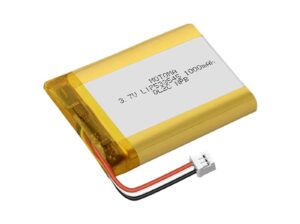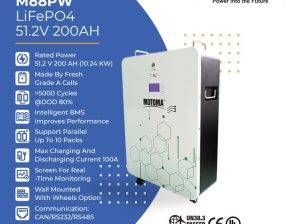Why Lithium ion batteries are the future?
Lithium-ion batteries have taken the world by storm in recent years, becoming the go-to power source for everything from electric cars to smartphones. With their high energy density, long life span, and quick charging times, it’s no surprise that they’re often touted as the future of battery technology. In this essay, we’ll explore some of the reasons why lithium-ion batteries are the future and what makes them so special.
Firstly, let us briefly discuss the basic principles of lithium-ion batteries. Li-ion batteries are rechargeable batteries that use lithium ions as the primary charge carrier. During charging, lithium ions move from the cathode to the anode, and during discharging, they move from the anode to the cathode. The cathode is typically made of a metal oxide, while the anode is made of graphite. The electrolyte, which is the medium that allows the flow of ions between the cathode and the anode, is typically a lithium salt in an organic solvent. The separator, which prevents the cathode and anode from coming into contact, is typically made of a porous polymer membrane.
One of the main reasons why lithium-ion batteries are the future is their high energy density. Energy density refers to the amount of energy stored per unit volume or unit mass. Li-ion batteries have a higher energy density than other rechargeable batteries, such as nickel-metal hydride batteries and lead-acid batteries. This means that they can store more energy in a smaller space, making them ideal for use in portable electronics and electric vehicles, where space is often limited.
Another reason why lithium-ion batteries are the future is their long cycle life. Cycle life refers to the number of charge-discharge cycles that a battery can undergo before its capacity begins to degrade significantly. Li-ion batteries have a longer cycle life than other rechargeable batteries, which means that they can be used for longer periods before they need to be replaced. This makes them more cost-effective in the long run, as they do not need to be replaced as frequently.
Furthermore, li-ion batteries have a low self-discharge rate. Self-discharge refers to the loss of capacity that occurs over time, even when a battery is not in use. Li-ion batteries have a lower self-discharge rate than other rechargeable batteries, which means that they can be stored for longer periods without needing to be recharged. This makes them ideal for use in emergency backup power systems and renewable energy storage, where they may need to sit unused for long periods before being used.
Another advantage of lithium-ion batteries is their fast charging capability. Li-ion batteries can be charged much faster than other rechargeable batteries, which makes them ideal for use in electric vehicles and portable electronics, where fast charging is often necessary. Fast charging also reduces the amount of time that a device needs to be connected to a power source, which makes it more convenient to use.
In addition to their technical advantages, lithium-ion batteries are also more environmentally friendly than other rechargeable batteries. Li-ion batteries do not contain toxic heavy metals, such as lead or cadmium, which can be harmful to the environment if not disposed of properly. They also have a lower carbon footprint than other types of batteries, as they can be charged using renewable energy sources such as solar or wind power.
One of the main challenges facing lithium-ion batteries is their safety. Li-ion batteries can be prone to thermal runaway, which can lead to fires or explosions if not handled properly. However, significant progress has been made in recent years to improve the safety of li-ion batteries, through the development of new materials and improved manufacturing processes.
In conclusion, lithium-ion batteries are the future due to their high energy density, long cycle life, low self-discharge rate, fast charging capability, and environmental friendliness. While safety remains a concern
Comments (5)
You must be logged in to post a comment.



[…] batteries are rechargeable batteries that use lithium ions to transfer energy between the cathode and anode. The anode is typically made of carbon, while the […]
[…] third benefit is that these batteries are environmentally friendly. LifePO4 batteries are made from lithium, which is a naturally occurring element and is not harmful to the environment. Additionally, these […]
[…] recent years, lithium iron phosphate (LifePO4) batteries have become increasingly popular, revolutionizing the way energy is stored. This technology has […]
[…] high upfront cost, but this is eventually offset over time. It’s not uncommon for high-quality lithium batteries to last up to 15 […]
[…] has become increasingly popular as the world looks for more sustainable energy sources.LiFePo4 batteries are being touted as the future solar power storage […]